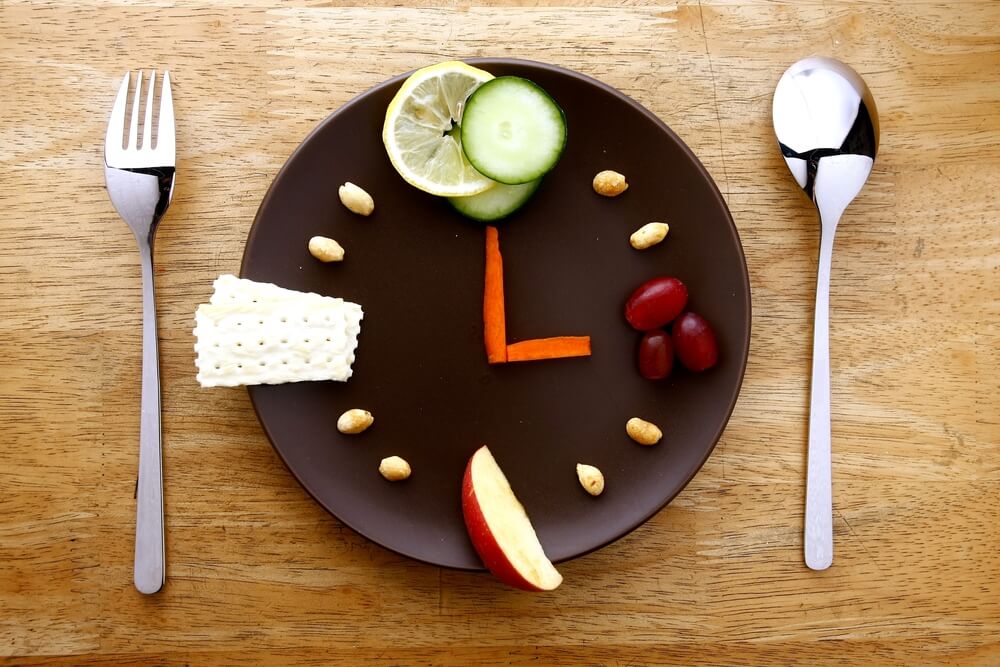Eat meals at a specific time in order to lose weight and stay healthier.
Should you eat meals at a specific time? Research shows that eating your meals at appropriate intervals has many benefits. You can learn the schedule for when you should eat each meal but you may have to alter it to fit into your daily schedule, especially if your work is not a 9 to 5 routine. Studies have shown that you can increase your energy level by eating at scheduled times, but if you are a random eater you may be draining your body of essential energy and nutrients. This is a healthy schedule for when you should eat each meal:
Breakfast
The best time to eat your breakfast is around 8 AM, but if you wake up earlier than 7AM or later than 8 AM it is best to eat breakfast within one hour after waking up. You need to replenish you energy level after you have slept for 6 to 8 hours. Eating a nutritious breakfast is important to keep your blood sugar levels balanced and provide you with the energy you will need to maintain endurance. A healthy breakfast should include at least one of these following items: whole grain cereal, oatmeal, fruits and vegetables, nuts, and brown rice.
Lunch Time
It is best to eat meals at a specific time so lunchtime should be around 12 noon, or at least within 4 hours after you have eaten breakfast. Noontime is usually when your day begins to peak so lunch is an essential part of providing your body with the energy it needs to function properly. Eating a balanced lunch with essential nutrients will help you stay focused and awake during your peak work hours. Try to avoid processed foods, and foods that contain lots of sugar and salt, trans-fats, and high fructose corn syrup. Eat a balanced meal that includes: fiber, complex carbohydrates, protein and healthy fats.
Snacks
You may begin to feel hungry between lunch and dinner, so eating a snack is a good way to keep your energy level up. You should eat a snack around 3 PM to satisfy your hunger and keep you going until dinnertime. Try to keep your portions small and eat below 200 calories. The U.S. Department of Health reports that most Americans are eating more than 500 to 600 calories for snacks each day, and this is contributing to the obesity problem in the country. Healthy snacks can include: yogurt, fruit, vegetables, soup, protein shakes, eggs, cheese, and nuts.
Dinner
What is the best time to eat dinner? Dinnertime should be around 6 PM, or at least within 2 to 3 hours after your late afternoon snack. Dinner should include the same lunch ingredients of fiber, complex carbohydrates, protein and healthy fats. Lean meats, poultry, fish, stews, vegetables, brown rice, salads etc. all make for a great evening dinner. For dessert try a piece of fruit instead of opting for sugary treats.
Late Night Snack
To eat meals at a specific time you have to include your snacks. The best time to eat your late night snack is around 9 PM or at least one hour before bedtime. Snacks should be nutrient rich and can include fruit, yogurt, nuts, and salads. You should avoid heavy meals which are hard to digest and can give you heartburn, which will interfere with your sleep.
Weight Loss
Our schedule of meal times is the best eating schedule to lose weight, with a few exceptions. Eating five times a day will keep you feeling fuller and will deter the temptation to overeat. The only difference that you will make is in your caloric intake. If you are dieting, try to keep your calories around 1,500 per day if you are a woman and around 1,800 if you are a man.
Eating five smaller meals throughout the day is a healthier way of eating, and gives your stomach a chance to digest food properly. When you eat meals at a specific time of the day, you are maintaining a good energy level and providing your body with the essential nutrients it needs to stay healthy.
Sources:
https://search.nih.gov/search?utf8=%E2%9C%93&affiliate=nih&query=meal+times&commit=Search
https://www.ncbi.nlm.nih.gov/pubmed/14704301
https://www.nhlbi.nih.gov/health/educational/lose_wt/eat/calories.htm
